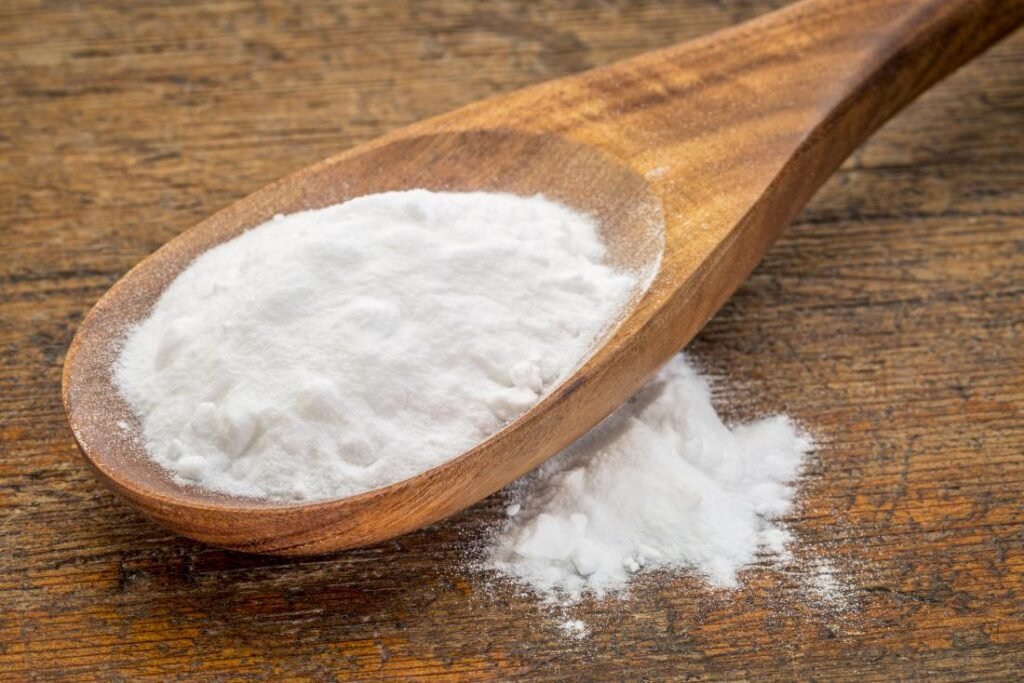Table of Contents
Suffering from indigestion? Many people turn to kitchen staples like apple cider vinegar (ACV) or baking soda for quick relief. But are these remedies truly effective, and more importantly, are they safe to use long-term? Let’s explore the science behind ACV and baking soda to understand their impact on your body.
Are These Indigestion Remedies Effective?
So today I want to talk about the difference between using baking soda versus apple cider vinegar for indigestion. There’s no doubt that you’re going to experience results if you take either/or, but the question is long-term, what can happen?
- Baking soda and apple cider vinegar can both provide indigestion relief.
- This article will discuss the long-term effects of both remedies.
About Your Body’s pH
So what I want to first talk about is this idea of pH of the body. There seems to be this push to alkalize the body, and I’m not sure exactly where that came from. It could be, I think there’s a book called alkalizer dye, it could be that, or it could be other things, but people tend to associate health with being alkaline and sickness with being acid.
- There is a popular belief that connects alkalinity with health and acidity with sickness.
- The source of this belief is unclear.
Okay, so I just want to first mention that when you’re talking about alkaline or acid, you have to be specific on what part of the body you’re talking about because, in the stomach, you need a pH between 1 & 3.
This is super acidic, but when we’re talking about the blood, we’re talking about a very narrow range between 7.35 and 7.45, 7 being neutral. So anything greater than 7 is more alkaline, and anything less than 7 is more acidic. So you can see blood is slightly alkaline.
- The stomach requires a highly acidic pH (1-3).
- Blood pH is slightly alkaline (7.35-7.45).
Acidosis and Alkalosis
Now, when we’re talking about being too acidic or too alkaline, we’re really talking about two different conditions, one being too acid, acidosis, and the other one too alkaline, being alkalosis. Now, if you understand the symptoms for each different condition, you can help to use the right remedy.
- Acidosis and alkalosis refer to overly acidic and overly alkaline bodily conditions, respectively.
- Understanding the symptoms of each condition can help determine the correct remedy.

So for the symptoms of acidosis: your nervous system is going to be irritated, you’re gonna feel nervous, you’re gonna sigh frequently like like that, you might have light or sound sensitivity, you might be dehydrated.
you might feel a lump in the throat when you’re swallowing, you’re gonna have a difficult time breathing in high altitudes, and there are certain conditions that can make you more acid, like ketoacidosis, which is a huge confusion for many people.
They think being in ketosis is the same as ketoacidosis. Ketoacidosis is a really rare but dangerous condition where you would have to be a diabetic type one and not control your blood sugars. In other words, you ignore taking insulin, so your blood sugars go really, really, really high, over 300, and your pH starts going high.
So that’s ketoacidosis. If you’re not a diabetic type one, you don’t have to worry about it, okay. It’s not gonna get that high.
- Acidosis symptoms include:
- Nervousness and irritation
- Frequent sighing
- Light and sound sensitivity
- Dehydration
- Difficulty swallowing
- Difficulty breathing at high altitudes
- Ketoacidosis is a serious condition related to type 1 diabetes and should not be confused with ketosis.
But if you have ketoacidosis, you have acidosis, and of course, you’d want to alkalize the body. There’s another condition called lactic acidosis, and lactic acidosis is another serious condition that can cause even a coma, and this could come from the side effect of taking certain medications.
Even metformin has a black label, and it says that it could lead to lactic acidosis. The remedy, the nutrient that prevents this is vitamin B1 and B12.
- Ketoacidosis requires alkalizing the body.
- Lactic acidosis is a serious condition that can be caused by certain medications.
- Vitamin B1 and B12 can help prevent lactic acidosis.
And then you have alkalosis. Okay. Now, with alkalosis, you’re gonna have muscle twitching, tetany, which is that little twitching maybe underneath your left eye or the arm or the leg, muscle spasm, cramps in your calf, muscle weakness, dehydration, which is the same over here because you’re not able to transport the minerals properly, allergies, and calcium deposits.
So, of course, with alkalosis, you wouldn’t want to alkalize the body even more; it’s too alkaline, does that make sense?
- Alkalosis symptoms include:
- Muscle twitching and tetany
- Muscle spasms and cramps
- Muscle weakness
- Dehydration
- Allergies
- Calcium deposits
- Alkalosis should not be treated with alkalizing agents.
Hypochlorhydria

Now I’m going to talk about another condition called hypochlorhydria. What that means is that your stomach doesn’t have either the quantity of acid or the strength of acid. The pH actually is between like 4, maybe 5, maybe even 6. So you have a higher pH in your stomach.
The Purpose of Stomach Acid
The purpose of this acid is to break down protein, absorb minerals, and kill pathogens. If you don’t have the strength of acid in your stomach, you can have incomplete digestion of protein.

you can have pathogens that could go into the system, and you’re also going to have difficulty absorbing minerals, and one of the big symptoms of that is anemia, and this is a very common problem, by the way, with a lot of people, especially as you get older.
- Hypochlorhydria is a condition characterized by low stomach acid.
- Stomach acid is essential for:
- Breaking down protein
- Absorbing minerals
- Killing pathogens
- Hypochlorhydria can lead to:
- Incomplete protein digestion
- Pathogen overgrowth
- Mineral malabsorption
- Anemia
Symptoms of Hypochlorhydria
So the symptoms of hypochlorhydria are GERD. Okay. GERD is basically where the valve at the top of the stomach doesn’t close, and we get acid coming up here. So it’s acid reflux
. The next one is indigestion. So think about it, people are taking antacids for GERD, acid reflux, and indigestion, which is a symptom of low stomach acid, which is going to neutralize the acid, which is going to then cause the need for more medication, which is going to cause more of the symptoms:
anemia because you’re not able to absorb the iron, constipation because you’re getting incomplete digestion of your protein, malabsorption of nutrients, carcinoma of the stomach, that’s cancer of the stomach.
- GERD (acid reflux) is a symptom of hypochlorhydria.
- Other symptoms of hypochlorhydria include:
- Indigestion
- Anemia
- Constipation
- Malabsorption of nutrients
- Stomach cancer
When to Use Baking Soda or Apple Cider Vinegar
And if you have low stomach acid, is that going to cause acidosis or alkalosis?
It’s going to be over here, alkalosis. So would you want to take something that alkalizes the body or acidifies the body? Well, I think it makes common sense to take apple cider vinegar for this condition, hypochlorhydria, and this condition, GERD, but take baking soda for this condition, acidosis.
- Low stomach acid is a symptom of alkalosis.
- Apple cider vinegar is recommended for hypochlorhydria and GERD.
- Baking soda is recommended for acidosis.
Baking Soda for Indigestion

So you might want to try this: if you have indigestion, try apple cider vinegar because, in the long run, you can actually correct it. Baking soda might temporarily make you feel better, but then the next time you eat, you’re back to square one.
The other thing you need to know about baking soda is that one teaspoon will give you like 1200 milligrams of sodium.
So if you’re already high in sodium and low in potassium, your blood pressure might increase, you might have other complications, and also, as far as the sodium and potassium ratios go, the more sodium you take, the less potassium you have, and this can create a whole series of other complications down the road.
- One teaspoon of baking soda contains about 1200mg of sodium
- High sodium intake can increase blood pressure and cause other complications
- Importance of maintaining proper sodium-potassium ratio
- Body requires about twice as much potassium as sodium
- When using baking soda, increase potassium intake through foods or supplements
- Apple cider vinegar may provide a long-term solution for indigestion, while baking soda offers temporary relief.
- Baking soda is high in sodium.
- High sodium intake can lead to health complications, especially for those with low potassium levels.
Most people, by the way, are very heavy on the sodium, but they don’t have enough potassium, and our bodies require about twice as much potassium to sodium.
So anytime you’re going to take baking soda, make sure that you also are consuming a lot of potassium foods or take a potassium supplement so you can keep these ratios in check.
- The body needs twice as much potassium as sodium.
- It is important to consume enough potassium, especially when taking baking soda.
Summary
There is no doubt that both of these home remedies for indigestion work. But I want to talk about the long-term effect of baking soda vs. apple cider vinegar.
Hypochlorhydria is a situation where you either don’t have enough stomach acid, or the acid is weak. The purpose of stomach acid is to help break down protein, to help kill pathogens, and to help with the absorption of minerals and trace minerals.
Symptoms of hypochlorhydria:
• GERD
• Acid reflux
• Indigestion
• Anemia
• Constipation
• Stomach infections
• Malabsorption
• Carcinoma
• Heartburn
Baking soda vs. Apple cider vinegar:
Baking soda
Baking soda for indigestion will make you feel better because it’s going to help remove some of that excess acid in your esophagus. But, the next time you eat, you’re still going to have the same symptoms because it’s not corrective. Baking soda also contains a tremendous amount of sodium. When you increase sodium, you deplete potassium, which is connected to many different conditions. You also deplete chloride. This can cause you to deplete hydrochloric acid in your stomach and then cause you to need more baking soda.
Apple cider vinegar
Apple cider vinegar is a great natural remedy for indigestion. You need to dilute it. Mix one tablespoon of apple cider vinegar in a glass of water and take it before you eat.
The fluids in your stomach should be acid, but the blood in the body should be slightly alkaline. Alkalizing the body is not the best thing to do in every situation.
Symptoms of acidosis:
• Irritated nerves
• Sighing frequently
• Sensitivity to light and sound
• A lump in the throat when you swallow
• Difficulty breathing in high altitudes
• Lactic acid
• Uric acid
Symptoms of alkalosis:
• Muscle twitching
• Muscle spasm
• Muscle weakness
• Muscle cramping
• Muscle tetany
• Allergies
• Dehydration
• Palpitations
• Loss of potassium
• Loss of calcium
Consider using baking soda when you have symptoms of acidosis. Consider using apple cider vinegar when you have symptoms of alkalosis. You may also want to use calcium, magnesium, or potassium for acidosis type symptoms. For indigestion, try apple cider vinegar.
DATA
https://www.ncbi.nlm.nih.gov/pmc/articles/PMC8839470
FAQ
Is it better to drink apple cider vinegar or baking soda?
Both apple cider vinegar (ACV) and baking soda have their own health benefits and applications, particularly for digestive issues.
- Apple Cider Vinegar: Often praised for its potential to aid digestion, ACV may help improve insulin sensitivity and lower blood sugar levels. It is also thought to introduce beneficial bacteria into the gut, which can aid in digestion.
- Baking Soda: This alkaline compound is typically used to neutralize stomach acid, providing quick relief from heartburn and indigestion. However, it can lead to increased sodium intake, which may not be suitable for everyone.
Ultimately, the choice between the two may depend on individual health needs and preferences. Consulting a healthcare provider is advisable for personalized recommendations.
Is baking soda and vinegar good for indigestion?
Baking soda and vinegar can both provide relief for indigestion, but they work in different ways.
- Baking Soda: It neutralizes excess stomach acid, offering quick relief from heartburn and indigestion symptoms. However, it does not address the underlying causes of these issues.
- Vinegar: Apple cider vinegar may help improve digestion by increasing stomach acidity, which can assist in breaking down food more effectively.
Using them together is not generally recommended, as the combination can produce gas and may not provide additional benefits beyond using them separately.
Is apple cider vinegar good for indigestion?
Apple cider vinegar is often touted as a natural remedy for indigestion.
- It is believed to help increase stomach acidity, which can aid in digestion and reduce symptoms of indigestion.
- Many people suggest diluting 1-2 tablespoons of ACV in a glass of water and consuming it before meals to alleviate digestive discomfort.
However, scientific evidence supporting its effectiveness is limited, and individuals should monitor their response to ensure it does not exacerbate symptoms.
How quickly does baking soda work for indigestion?
Baking soda typically works quickly to relieve indigestion symptoms.
- Many people report feeling relief within 15 to 30 minutes after consuming a mixture of baking soda dissolved in water.
- It neutralizes stomach acid, providing rapid relief from heartburn and discomfort. However, this effect is temporary, and the underlying causes of indigestion may still need to be addressed.
How to take apple cider vinegar for acid reflux
To use apple cider vinegar for acid reflux, follow these steps:
- Dilute: Mix 1-2 tablespoons of apple cider vinegar in a glass of water.
- Timing: Drink this mixture before meals or when experiencing symptoms.
- Frequency: You may take this remedy once or twice daily, but start with a smaller amount to assess tolerance.
It’s important to avoid consuming undiluted vinegar, as it can damage tooth enamel and irritate the throat.
Apple cider vinegar and baking soda for acid reflux
Combining apple cider vinegar and baking soda is not generally recommended for acid reflux.
- While both substances can offer relief when taken separately, mixing them can lead to a chemical reaction that produces gas, potentially causing bloating and discomfort.
- Additionally, the benefits of each may be diminished when combined, as baking soda neutralizes the acidity of vinegar, which is thought to aid digestion.
Apple cider vinegar for indigestion and gas
Apple cider vinegar may help alleviate symptoms of indigestion and gas for some individuals.
- The acetic acid in ACV can promote better digestion and may help reduce bloating by improving gut health.
- It is often recommended to dilute ACV in water and consume it before meals to maximize its potential benefits.
What happens when you mix baking soda and apple cider vinegar?
Mixing baking soda and apple cider vinegar results in a chemical reaction that produces carbon dioxide gas, which can cause bubbling and fizzing.
- While this reaction can be visually interesting, consuming the mixture may lead to gas and bloating if not allowed to settle.
- There are no significant health benefits reported from consuming the mixture, and it may be best to use each ingredient separately for digestive issues.
Apple cider vinegar for acid reflux recipe
A simple recipe for using apple cider vinegar for acid reflux is as follows:
- Ingredients:
- 1-2 tablespoons of apple cider vinegar
- 1 cup of water
- Optional: 1 teaspoon of honey for taste
- Instructions:
- Mix the apple cider vinegar with water.
- Optionally, add honey to improve the flavor.
- Drink this mixture before meals or when experiencing symptoms.
Is apple cider vinegar good for GERD?
Apple cider vinegar is sometimes suggested as a remedy for gastroesophageal reflux disease (GERD), but scientific evidence is limited.
- Some individuals report relief from symptoms when taking diluted ACV, as it may help improve digestion.
- However, because ACV is acidic, it could potentially worsen symptoms for some people. Consulting a healthcare provider is recommended before trying it as a treatment for GERD.
Can you take omeprazole and apple cider vinegar together?
Taking omeprazole, a proton pump inhibitor, alongside apple cider vinegar is generally not recommended without medical advice.
- Omeprazole reduces stomach acid production, while apple cider vinegar is acidic. The combination may counteract the effects of the medication.
- It’s essential to discuss with a healthcare provider before combining these treatments to ensure safety and effectiveness.
Baking soda, apple cider vinegar, and lemon juice
Combining baking soda, apple cider vinegar, and lemon juice is not advisable due to the potential for excessive gas production and digestive discomfort.
- Each ingredient has its own benefits, but mixing them can lead to an unpredictable reaction in the stomach.
- For digestive relief, it is better to use each ingredient separately, ensuring that you monitor how your body responds to each one.




